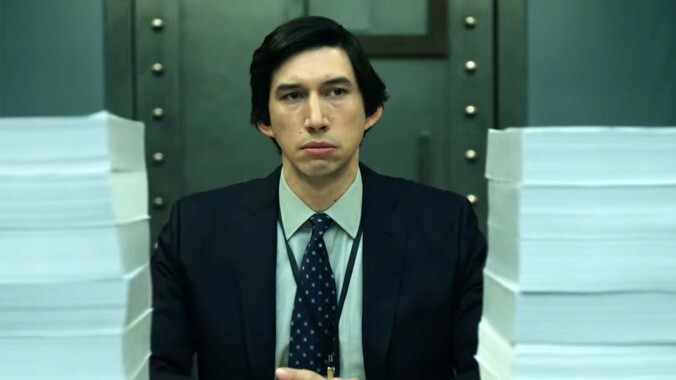Adam Driver makes congressional oversight exciting in the political drama The Report


It’s become a cliché to say that some actors are so good that they can hold an audience’s attention just by reading the phone book in an empty room. But that’s more or less what Adam Driver does in the political drama The Report, and danged if he isn’t riveting. Playing the dogged Senate investigator Daniel Jones, Driver spends much of the film sitting in a windowless, sparsely furnished basement office, reading wonky details about illicit government operations off a computer screen. He gives these monologues the full Driver treatment, with rapid fire line-readings that escalate from a scarily controlled monotone to an intensely seething hiss, all delivered in his uniquely arrhythmic cadence, which sounds a little like a bicycle that occasionally slips a gear while chugging uphill.
Written and directed by frequent Steven Soderbergh collaborator Scott Z. Burns, The Report tells a story ripped from the headlines. But it’s not recent headlines, which may make the movie more of a tough sell. The real Jones worked for California Senator Dianne Feinstein (played here by Annette Bening) and spent years on a fact-finding mission, tracking the escalation of President George W. Bush’s war on terror into acts of torture forbidden by international law.
Jones’ team was given access to classified documents, though not without some pushback, and not without some redactions. They had limited power to interrogate witnesses, which meant that much of their job consisted of sifting through hundreds of thousands of pages of preexisting memos, transcripts, and mission debriefs, looking for dots to connect. The ultimate goal was to get into the congressional record—and thus to put in front of the public—detailed reports of Americans torturing military prisoners, so that subsequent authorities could determine whether the agents involved just went rogue, or whether this was policy dictated from the top.
Burns doesn’t exactly invent a new cinematic language with The Report. The film has very little visual flair, outside of some illustrative animation, used to indicate where the audience is in the big timeline Jones is constructing. But this is an unusually fast-paced two hours, helped by the energy of an A-list cast and by Burns’ smart use of flashbacks, recreating what happened at CIA “black sites.” The movie is assembled like a prize-winning piece of magazine journalism, with plenty of historical and cultural context, much of it provided by the colorful characters who keep popping up throughout the piece.
The Report is valuable as a depiction of how political power has a way of warping priorities. At the start of Feinstein’s investigation, Bush is in the White House and the Democrats are in the minority, making Jones and his colleagues insignificant pests to the administration—annoying, but easily squashed if necessary. Later, though, the senator can’t get her report authorized for release, because Obama flacks (led by Chief of Staff Denis McDonough, played with entertaining cockiness by Jon Hamm) don’t see any upside in embarrassing their allies at the CIA and FBI.
This is what ultimately makes The Report relevant to 2019, beyond its rehashing of crimes that might be in danger of being forgotten, given the many scandals and news cycles that have come and gone since “The Committee Study Of The Central Intelligence Agency’s Detention And Interrogation Program” finally received a partial release in 2014. Anyone who follows the news will recognize some familiar names here (such as Robert Mueller, who was the FBI director during much of the investigation). But there are also echoes throughout the picture of constitutional crises past, present, and future, evident whenever a representative of one of the branches of the U.S. government simply refuses to be held accountable by another.
And yet while The Report is chilling, it also expresses a persistent faith in American institutions to keep the citizenry properly informed. The character Driver is playing considers himself a patriotic public servant, working for a senator who knows every arm to twist and every parliamentary loophole to exploit. The actor’s performance isn’t just gripping; it’s inspiring. He’s not just portraying Jones; he’s embodying an ideal.